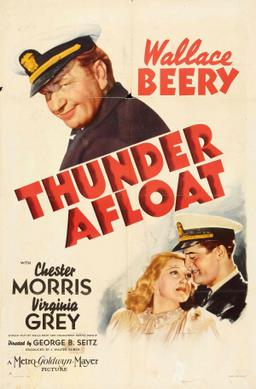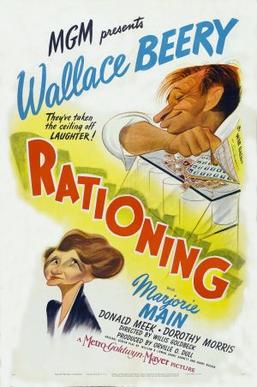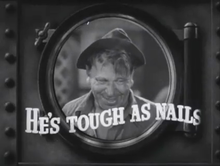
Wallace Fitzgerald Beery was an American film and stage actor. He is best known for his portrayal of Bill in Min and Bill (1930) opposite Marie Dressler, as General Director Preysing in Grand Hotel (1932), as the pirate Long John Silver in Treasure Island (1934), as Pancho Villa in Viva Villa! (1934), and his title role in The Champ (1931), for which he won the Academy Award for Best Actor. Beery appeared in some 250 films during a 36-year career. His contract with Metro-Goldwyn-Mayer stipulated in 1932 that he would be paid $1 more than any other contract player at the studio. This made Beery the highest-paid film actor in the world during the early 1930s. He was the brother of actor Noah Beery and uncle of actor Noah Beery Jr.

Min and Bill is a 1930 American pre-Code comedy-drama film, directed by George W. Hill and starring Marie Dressler and Wallace Beery. Adapted by Frances Marion and Marion Jackson from Lorna Moon's 1929 novel Dark Star, the film tells the story of dockside innkeeper Min's tribulations as she tries to protect the innocence of her adopted daughter, Nancy, while loving and fighting with boozy fisherman Bill, who resides at the inn. The picture was a runaway hit. In 1931, the studio released a Spanish-language version of Min and Bill, La fruta amarga, directed by Arthur Gregor and starring Virginia Fábregas and Juan de Landa.

Hell Divers is a 1932 American pre-Code black-and-white film from Metro-Goldwyn-Mayer starring Wallace Beery and Clark Gable as a pair of competing chief petty officers in early naval aviation. The film, made with the cooperation of the United States Navy, features considerable footage of flight operations aboard the Navy's second aircraft carrier, the USS Saratoga, including dramatic shots of takeoffs and landings filmed from the Curtiss F8C-4 Helldiver dive bombers after which the movie was named.

Noah Lindsey Beery was an American actor often specializing in warm, friendly character roles similar to many portrayed by his Oscar-winning uncle, Wallace Beery. Unlike his more famous uncle, however, Beery Jr. seldom broke away from playing supporting roles. Active as an actor in films or television for well over half a century, he was best known for playing James Garner's character's father, Joseph "Rocky" Rockford, in the NBC television series The Rockford Files (1974–1980). His father, Noah Beery, enjoyed a similarly lengthy film career as an extremely prominent supporting actor in major films, although the elder Beery was also frequently a leading man during the silent film era.

Marjorie Burnet Rambeau was an American film and stage actress. She began her stage career at age 12, and appeared in several silent films before debuting in her first sound film, Her Man (1930). She was twice nominated for the Academy Award for Best Supporting Actress for her roles in Primrose Path (1940) and Torch Song (1953), and received the 1955 National Board of Review Award for Best Supporting Actress for her roles in A Man Called Peter and The View from Pompey's Head.

Elizabeth Bellamy is a fictional character in the ITV period drama Upstairs, Downstairs, originally broadcast for five series from 1971 to 1975. She was portrayed by Nicola Pagett.

Raymond William Hatton was an American film actor who appeared in almost 500 motion pictures.
"The Wife Aquatic" is the tenth episode of the eighteenth season of the American animated television series The Simpsons. It originally aired on the Fox network in the United States on January 7, 2007. The episode was written by Kevin Curran and directed by Lance Kramer.

20 Mule Team is a 1940 American western film directed by Richard Thorpe and starring Marjorie Rambeau, Anne Baxter and Wallace Beery, who appears with his nephew Noah Beery Jr. The film was originally released in sepia-tone, a brown-and-white process used by the studio the previous year for the Kansas scenes in The Wizard of Oz.

Barbary Coast Gent is a 1944 American Western comedy film set in 1880s San Francisco's Barbary Coast and Nevada starring Wallace Beery. The movie was directed by Roy Del Ruth and features Binnie Barnes, Beery's brother Noah Beery, Sr., John Carradine, and Chill Wills. It is also known as Gold Town, Honest Plush Brannon and The Honest Thief.

Thunder Afloat is a 1939 World War I naval film starring Wallace Beery and Chester Morris. The movie was directed by George B. Seitz.

Rationing is a 1944 American comedy film about governmental restrictions on the sale of food, fuel, and other consumer items and services in the United States during World War II. Directed by Willis Goldbeck and distributed by Metro-Goldwyn-Mayer, the production stars Wallace Beery and features Marjorie Main.

A Date with Judy is a 1948 American musical romantic comedy Technicolor film directed by Richard Thorpe and starring Wallace Beery, Jane Powell and Elizabeth Taylor. The film is based on the radio series of the same name.

Big Jack is a 1949 American Western film starring Wallace Beery, Richard Conte and Marjorie Main. The movie was directed by Richard Thorpe, and the screenplay was written by Gene Fowler and Otto Eis from the novel by Robert Thoeren. The picture is a comedy-drama, set on the American frontier in the early 1800s, about outlaws who befriend a young doctor in legal trouble for acquiring corpses for anatomical research.

Primrose Path is a 1940 film about a young woman determined not to follow the profession of her mother and grandmother: prostitution. It stars Ginger Rogers and Joel McCrea. The film was an adaptation of the novel February Hill by Victoria Lincoln.

"The End of Something" is a short story written by Ernest Hemingway, published in the 1925 New York edition of In Our Time, by Boni & Liveright. The story is the third in the collection to feature Nick Adams, Hemingway's autobiographical alter ego.

Alaska Seas is a 1954 American adventure film directed by Jerry Hopper and starring Robert Ryan and Brian Keith. The supporting cast features Jan Sterling, Gene Barry and Aaron Spelling. The picture is a loose remake of the 1938 film Spawn of the North, which had starred George Raft, Henry Fonda and John Barrymore.

There Goes My Heart is a 1938 American romantic comedy film starring Virginia Bruce and Fredric March, and directed by Norman Z. McLeod. Bruce plays a wealthy heiress who goes to work under an alias at a department store owned by her grandfather, and March the reporter who tracks her down. The film is based on a story by Ed Sullivan, better known for his long-running Ed Sullivan Show. The film was nominated for a Best Score Oscar for Marvin Hatley.

Piracy on Falcon Lake refers to an increase in crime at the border between the United States and Mexico on Falcon Lake. The lake is a 60-mile (97 km) long reservoir of the Rio Grande that was constructed in 1954 and is a known drug smuggling route.

Behind the Door is a surviving 1919 silent war drama film produced by Thomas Ince, directed by Irvin Willat and distributed by Paramount Pictures. The picture is a starring vehicle for veteran actor Hobart Bosworth and the supporting cast features Jane Novak and Wallace Beery. The film's source is a short story by Gouverneur Morris, also titled "Behind the Door," published in McClure's Magazine in July 1917. The film is extant at the Library of Congress and the Gosfilmofond Russian State Archive. In 2016, the San Francisco Silent Film Festival, working with the Library of Congress and Gosfilmofond, created a more fully-restored print of the film.





















